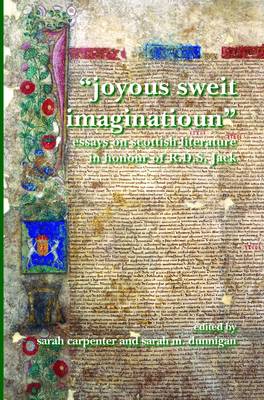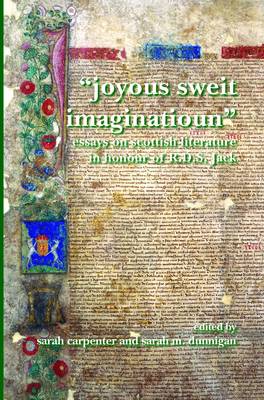
- Afhalen na 1 uur in een winkel met voorraad
- Gratis thuislevering in België vanaf € 30
- Ruim aanbod met 7 miljoen producten
- Afhalen na 1 uur in een winkel met voorraad
- Gratis thuislevering in België vanaf € 30
- Ruim aanbod met 7 miljoen producten
Zoeken
Joyous Sweit Imaginatioun
Essays on Scottish Literature in Honour of R.D.S. Jack
€ 131,45
+ 262 punten
Omschrijving
This volume gathers together essays on Scottish literature, diverse in historical period, mode, and form in honour of Professor R.D.S. Jack, Professor Emeritus of English Literature at the University of Edinburgh. Chronologically, the collection sweeps from the early middle ages to the early twentieth century, from Robert Henryson to J.M. Barrie, conveying a sense of the shifting and subtle identities and continuities of Scottish literary traditions across the centuries, and opening up, through a distinctive and unusual range of writers and texts, unfamiliar aesthetic, cultural, and linguistic landscapes. Unusual and wide-ranging in subject and scope, the volume explores Scottish medieval romance and allegory, Renaissance court performance, early modern travel writing, seventeenth-century poetry, Sir Thomas Urquhart's universal language theory, Scottish Romanticism, Burns and Barrie. Shared threads of interest run through the collection: a questioning of the canonical; attentiveness to questions of language, rhetoric, and form; and a commitment to uncovering the dynamic interaction between European and Scottish traditions. Collectively, the volume charts a new series of imaginative cross-currents across historical periods and literary modes, attesting the importance of, and necessity for, a critical vision of Scottish literature which is pluralistic, comparative, and sensitive to form, mode, and rhetoric.
Specificaties
Betrokkenen
- Uitgeverij:
Inhoud
- Aantal bladzijden:
- 252
- Taal:
- Engels
- Reeks:
- Reeksnummer:
- nr. 9
Eigenschappen
- Productcode (EAN):
- 9789042023130
- Verschijningsdatum:
- 1/01/2007
- Uitvoering:
- Paperback
- Formaat:
- Trade paperback (VS)
- Afmetingen:
- 155 mm x 235 mm
- Gewicht:
- 426 g

Alleen bij Standaard Boekhandel
+ 262 punten op je klantenkaart van Standaard Boekhandel
Beoordelingen
We publiceren alleen reviews die voldoen aan de voorwaarden voor reviews. Bekijk onze voorwaarden voor reviews.







